In this week’s review of Court Judgments, we look at Supreme Court’s directions in a case relating to sexual harassment and its observations regarding prosecution based on suspicion. We also look at Karnataka High Court’s observation about married daughter’s entitlement for accidental insurance compensation, Allahabad High Court’s judgment taking into consideration the need to provide scope for reform for convict and Gujarat High Court’s statement of electricity company not needing to take permission from landowner for overhead installation.
Karnataka HC: Married daughter entitled to Motor Accident compensation for Parent’s Death.
The single judge bench comprising of Justice H P Sandesh observed that there cannot be discrimination between sons & daughters and even married daughters are entitled to compensation from the insurance company on the death of their parent in an accident.
This observation was made in the case Reliance General Insurance Company Ltd vs. Gangappa S/O. Chinnappa Saunshi, where-in the insurance company filed an appeal challenging the order of the Motor Accident Claim Tribunal.
Justice H P Sandesh relied on an earlier judgment of the Supreme Court in the case National Insurance Company Ltd vs. Birender & Ors, wherein it was settled that the legal representatives of the deceased have the right to apply for compensation. It was also observed that even the major married and earning sons of the deceased (being legal representatives of the deceased) have a right to apply for the compensation and the application needs to be considered irrespective of whether the legal representatives are fully dependent on the deceased.
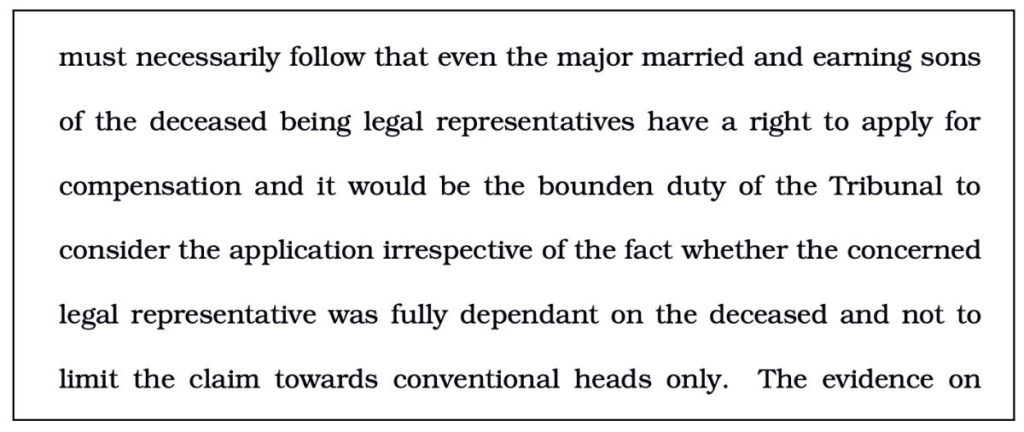
The court observed that there cannot be discrimination between married sons or daughters. It stated that the contention that married daughters of the deceased is not entitled to compensation cannot be accepted by the court.

The insurance company also contended that there is negligence on the part of the driver of the tempo in which the deceased was travelling and hence the tribunal ought to have taken this contributory negligence into consideration. However, the court noted that the insurance company has failed to provide any proof of the negligence of the driver and has also not even examined the official witness. Hence, the question of the tribunal considering contributory negligence does not arise. The single court bench proceeded to dismiss the contentions and the appeal by the insurance company.
Gujarat HC: The electricity company does not require the landowner’s consent for laying down overhead transmission.
In the case of Parth Krishnakant Patel vs. Managing Director/General Manager (Legal Cell), the Gujarat High court held that an electricity company does not require the consent of a private landowner to lay overhead high tension transmission lines.
As per the case details, the Court was hearing a writ petition seeking the installation of an electric line inside and underneath the plot of the petitioner. It is stated that the line passing overhead on the private land of the petitioner had caused the value of the land to deteriorate. It is noted that there was no consent sought from the petitioner before laying the line. The petitioner further claimed that the plot is now divided into two halves and the other half has become redundant.
Referring to the earlier cases, the High Court has concluded that similar contentions raised by individuals for the passing of transmission lines through their land have been specifically rejected. The single judge bench of Justice Biren Vaishnav relied on the judgment given in the case, Gujarat State Electricity Transmission Corporation Ltd, vs. Ratilal Magnanji Brahmbhatt.

The High Court dismissed the petition filed stating that neither the consent of the landowner was necessary, nor was he required to be heard. However, it permitted the petitioners to raise disputes regarding compensation u/s 16(4) of the Telegraph Act.
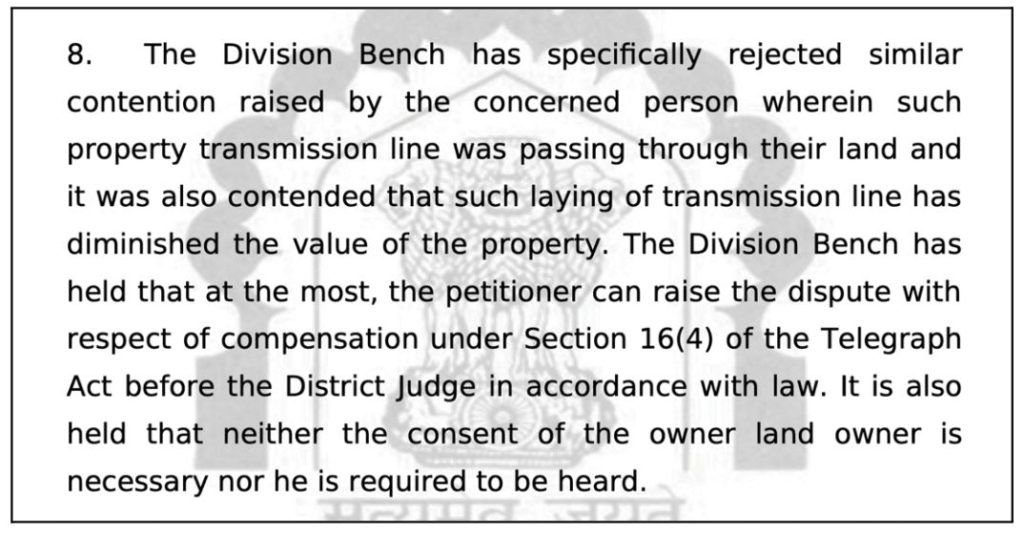
Supreme Court: Issues directions to avoid agony and harassment for women who file complaints of sexual harassment.
The Supreme Court bench comprising of Justice D.Y. Chandrachud and Justice JB Pardiwala reiterated the importance of courts dealing with victims of sexual crimes in a sensitive manner and issued directions to the trial courts to avoid agony and harassment for women who file complaints of sexual harassment.
The bench noted that legal proceedings tend to involve more efforts for complainants of sexual assault as they are dealing with trauma and societal shame. Hence, it is the responsibility of the courts to appropriately handle such matters.

These directions were given in the case, XYZ vs. State of Madhya Pradesh. As per the case, the appellant, a yoga instructor alleged that the then vice-chancellor of the Institute has touched her inappropriately. She was threatened with discharge from the service on having refused his demands. She lodged a complaint at the police station. After no action was taken, a further complaint was filed with the Superintendent of Police (SP). However, no action was taken even after complaining twice to the SP. She then moved to the Judicial Magistrate First Class (JMFC) under Section 156(3) of the CrPC.
JMFC directed the police to file a status report, which was delayed due to the onset of the COVID-19 pandemic. JMFC observed that although prima facie, there is the occurrence of the offence by the accused persons, the case cannot be decided without collecting the evidence. It further provided the complainant the liberty to examine the witnesses under Sections 200 and 202 CrPC. This was questioned by the appellant. However, the High Court dismissed the application on the ground that JMFC is not under the obligation to direct the police to register FIR.
The appellant approached the Supreme Court, appealing against the High Court’s order dismissing her application, The Supreme Court recognised that in cases alleging sexual harassment or sexual assault, the victim would possibly be traumatised and therefore the court should not further the burden the complainant and should press upon the police to investigate. In view of the circumstances, it might not also be possible for the complainant to retrieve important evidence regarding the complaint. In this regard, the court gave the following directions.
- Allowing proceedings to be conducted in camera, when appropriate, either under sections 327 CrPC or involves the aggrieved person (or other witnesses) testifying to their experience of sexual harassment or violence.
- Allowing the installation of a screen to ensure the aggrieved woman does not have to see the accused while testifying. Or direct the accused to leave the room while the aggrieved woman’s testimony is being recorded.
- Ensuring the counsel for the accused conducts the cross-examination of the aggrieved woman in a respectful fashion and without asking inappropriate questions, especially regarding the sexual history of the aggrieved woman.
- Completing cross-examination in one sitting, as far as possible,
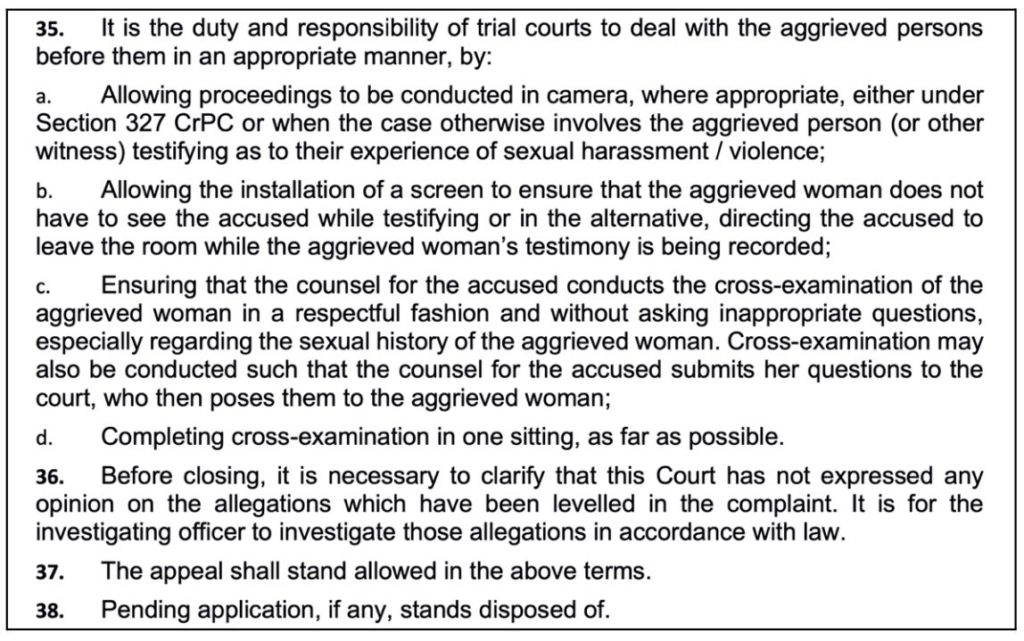
Allahabad HC: No accused is incapable of being reformed
In the case, Babu vs. the State of U.P, the Allahabad High Court bench of Justice Dr. Kaushal Jayendra Thakur and Justice Ajai Tyagi, modified the sentence of an accused convicted under Section 304 of IPC.
The bench observed that no accused person is incapable of being reformed and hence measures need to be taken to give them an opportunity for reformation and bring them into the social stream.
The bench was hearing an appeal moved by Babu, who was convicted under Section 304(i) read with Sections 34 IPC and under Section 4/25 Arms Act by Court of Additional Sessions Judge, Badaun.
As per the prosecution, the convict along with co-accused Munna was found guilty of killing Rani (deceased). The complainant (Kamlesh) returned home with her mother Rani after purchasing vegetables. Both the accused came from behind and Babu put his hand on the shoulder of Rani, who gave a jerk and moved ahead. Babu took a knife from his clothes and stabbed Rani and ran away. She died later. The appellant filed the appeal for a reduction of the sentence. The appellant is already in jail for the past 9 years.
The court observed that nothing new has come out which would benefit the appellant. Further, the knife which was used for the crime was recovered by the investigating officer with the accused Babu. The injuries mentioned in post mortem report corroborate with the injuries that could be inflicted by a weapon like a knife. The court concluded that the accused is the perpetrator of the offence.
It further considered the question as to whether the sentence of life imprisonment was adequate or the sentence is required to be modified. The court considered the earlier rulings of the Apex court, wherein it stated that while considering the imposition of punishment, the impact of crime on society as a whole and the rule needs to be balanced. It stressed that undue harshness should be avoided while sentencing keeping in view the reformative approach underlying in the criminal justice system.
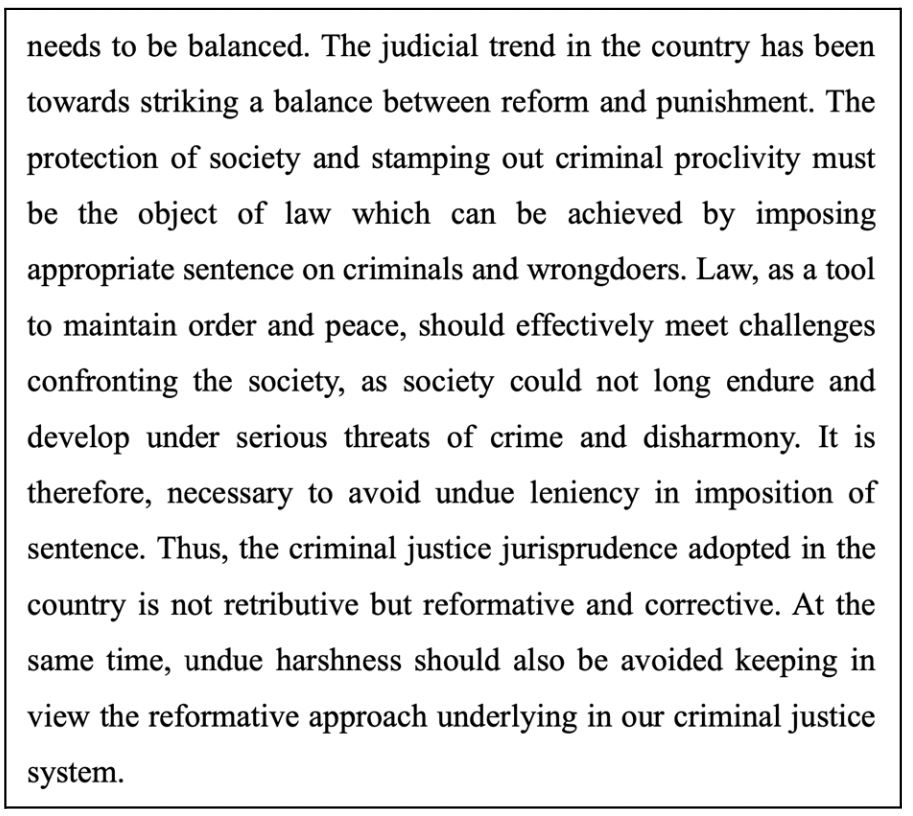
The court noted that in this case, the sentence of life term was very harsh in view of the entirety of the facts and circumstances. Therefore, the sentence awarded was modified as a sentence of 10 years rigorous imprisonment along with a fine of Rs.10,000.
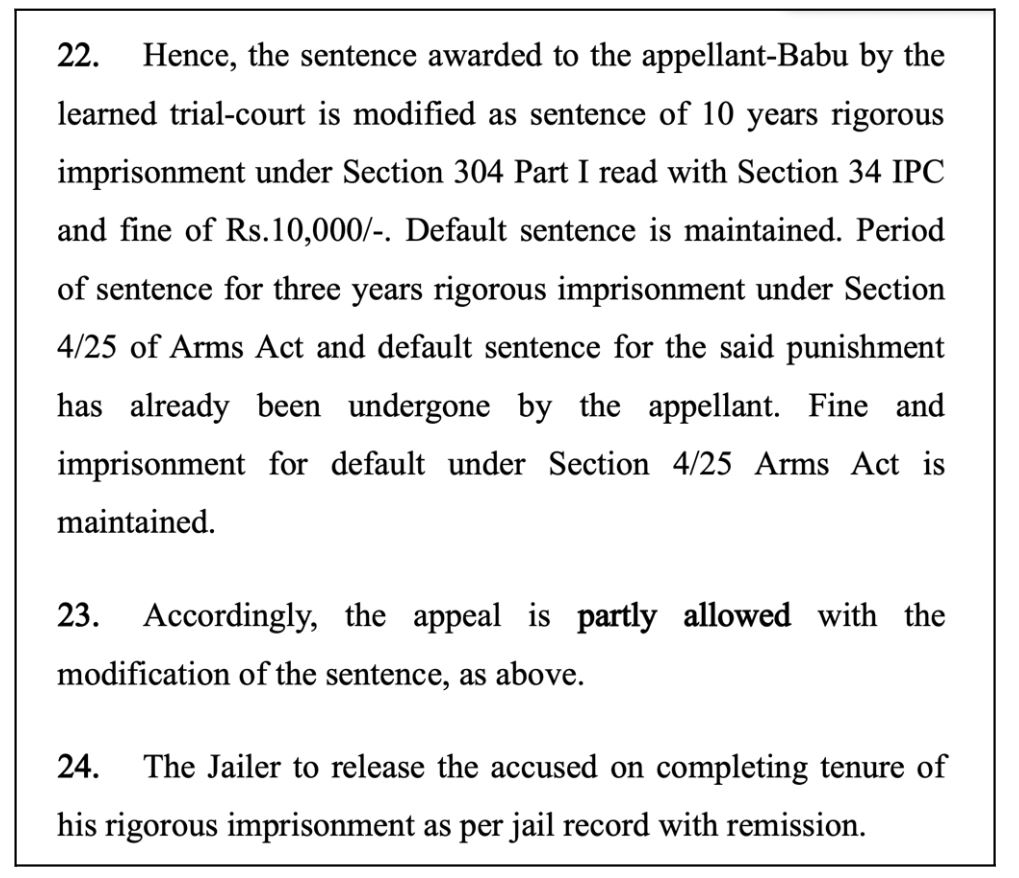
SC: Suspicion however strong cannot be ground for Conviction
Supreme Court has observed that an accused cannot be convicted on the ground of suspicion, no matter how strong it is. In the case, Ram Niwas vs. the State of Haryana, the Supreme Court Bench consisting of Justice BR Gavai and PS Narasimha, reiterated this and acquitted the accused in the murder case.
As per the case details, the accused Ram Niwas was accused of the murder of Dalip Singh. The Trial Court convicted him under Section 302 IPC, which was confirmed by the Punjab and Haryana High Court.
In their appeal, it was contended that in the absence of prosecution proving that the dead body was of deceased Dalip Singh, the conviction was not sustainable. The doctor who conducted the post-mortem stated that the face of the dead body was unrecognizable. It was presented that the state relied on the extra-judicial confessions made by the accused. Based on the available evidence, the bench observed that the prosecution rests on circumstantial evidence.
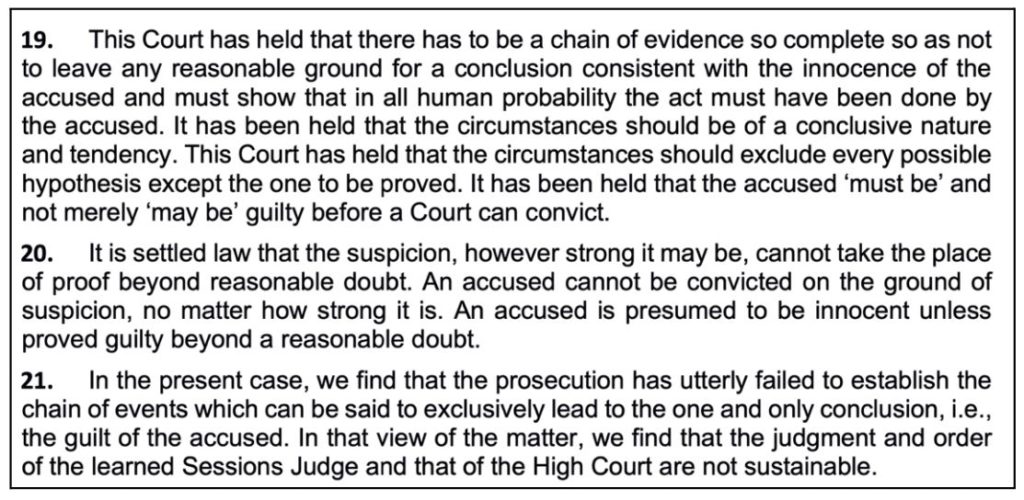
Featured Image: Review of Court Judgments


